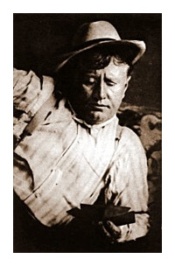O. HENRY: The World and the Door
 The World and the Door
The World and the Door
by O. Henry
A favourite dodge to get your story read by the public is to assert that it is true, and then add that Truth is stranger than Fiction. I do not know if the yarn I am anxious for you to read is true; but the Spanish purser of the fruit steamer El Carrero swore to me by the shrine of Santa Guadalupe that he had the facts from the U.S. vice-consul at La Paz—a person who could not possibly have been congnizant of half of them.
As for the adage quoted above, I take pleasure in puncturing it by affirming that I read in a purely fictional story the other day the line: “ ‘Be it so,’ said the policeman.” Nothing so strange has yet cropped out in Truth.
When H. Ferguson Hedges, millionaire promoter, investor and man-about-New-York, turned his thoughts upon matters convivial, and word of it went “down the line,” bouncers took a precautionary turn at the Indian clubs, waiters put ironstone china on his favourite tables, cab drivers crowded close to the curbstone in front of all-night cafés, and careful cashiers in his regular haunts charged up a few bottles to his account by way of preface and introduction.
As a money power a one-millionaire is of small account in a city where the man who cuts your slice of beef behind the free-lunch counter rides to work in his own automobile. But Hedges spent his money as lavishly, loudly and showily as though he were only a clerk squandering a week’s wages. And, after all, the bartender takes no interest in your reserve fund. He would rather look you up on his cash register than in Bradstreet.
On the evening that the material allegation of facts begins, Hedges was bidding dull care begone on the company of five or six good fellows— acquaintances and friends who had gathered in his wake.
Among them were two younger men—Ralph Merriam, a broker, and Wade, his friend.
Two deep-sea cabmen were chartered. At Columbus Circle they hove to long enough to revile the statue of the great navigator, unpatriotically rebuking him for having voyaged in search of land instead of liquids. Midnight overtook the party marooned in the rear of a cheap café far uptown.
Hedges was arrogant, overriding and quarrelsome. He was burly and tough, iron-gray but vigorous, “good” for the rest of the night. There was a dispute—about nothing that matters—and the five-fingered words were passed—the words that represent the glove cast into the lists. Merriam played the rôle of the verbal Hotspur.
Hedges rose quickly, seized his chair, swung it once and smashed wildly down at Merriam’s head. Merriam dodged, drew a small revolver and shot Hedges in the chest. The leading roysterer stumbled, fell in a wry heap, and lay still.
Wade, a commuter, had formed that habit of promptness. He juggled Merriam out a side door, walked him to the corner, ran him a block and caught a hansom. They rode five minutes and then got out on a dark corner and dismissed the cab. Across the street the lights of a small saloon betrayed its hectic hospitality.
“Go in the back room of that saloon,” said Wade, “and wait. I’ll go find out what’s doing and let you know. You may take two drinks while I am gone—no more.”
At ten minutes to one o’clock Wade returned.
“Brace up, old chap,” he said. “The ambulance got there just as I did. The doctor says he’s dead. You may have one more drink. You let me run this thing for you. You’ve got to skip. I don’t believe a chair is legally a deadly weapon. You’ve got to make tracks, that’s all there is to it.”
O. Henry
(1862 – 1910)
The World and the Door
fleursdumal.nl magazine
More in: Archive G-H, Henry, O.

